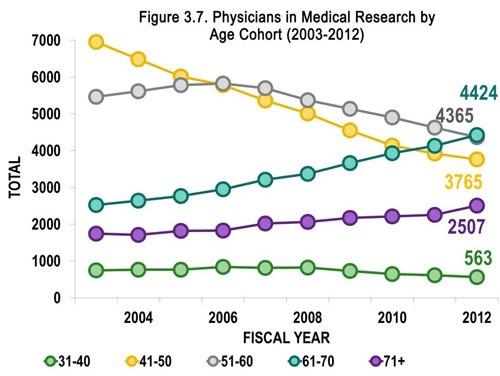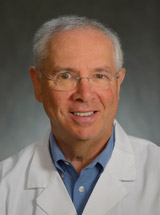Remapping the Clinical Neurosciences through Translation and Innovation Training
ReConNecT-IT
The Remapping the Clinical Neurosciences through Translation and Innovation Training (ReConNecT-IT) T32 fellowship program aims to address the critical need for physician scientists in the neurosciences. Indeed, in 2014 NIH Physician Scientist Workforce Report identified only 8200 physicians with NIH grants, with approximately half of these investigators holding MD-PhD degrees and half with MD-only degrees. More troubling, the report found that from 2002-2012, the number of physician scientists diminished in every age group except for those who were over 60. Thus, the size of this workforce is currently small and in danger of shrinking further as current investigators retire (Figure 1).

Frances Jensen, MD
Chair, Department of Neurology, Co-Director Penn Medicine Translational Neuroscience Center, Perelman School of Medicine at the University of Pennsylvania

Geoffrey Aguirre, MD, PhD
Professor of Neurology, Perelman School of Medicine at the University of Pennsylvania
Concurrent with the shrinkage of the physician-scientist workforce, there has been a rapid expansion of scientific knowledge in the neurosciences. Recent advances in cellular, molecular, genomic, imaging, and systems neuroscience create new opportunities to address the disorders of the human brain. However, to harness the fundamental knowledge being gained in neuroscience for the benefit of patients suffering from brain diseases, it is crucial and urgent to bolster the pipeline of physician neuroscientists in training.
First funded in 2014, the ReConNecT-IT T32 program builds on a track record of success. Penn Medicine exists in the context of a large university, with access to many other schools including arts and sciences, engineering, and veterinary schools. This creates extraordinary opportunities for multidisciplinary research across species and across the lifespan.
The ReConNecT-IT T32 features 20 training faculty from the departments of

Marc Dichter, MD, PhD
Professor of Neurology (Emeritus), Perelman School of Medicine at the University of Pennsylvania

Sharon Xie, PhD
Professor of Biostatistics and Epidemiology, Perelman School of Medicine at the University of Pennsylvania
Neurology, Psychiatry, Ophthalmology, Physiology, Neurosurgery, and Anesthesiology within the Perelman School of Medicine (PSOM), as well as faculty from the School of Arts of Sciences and the School of Engineering at the University of Pennsylvania (Penn). Unifying these faculty are (1) research interests in neuroscientific fields, and (2) a track record of successful mentorship. Among these 20 faculty, 16 are MD or MD-PhD researchers who direct neuroscience-related research labs ranging from model-organism approaches to assays of human biospecimens, offering many potential role models for physician scientist trainees. We believe that the rich and diverse scientific environment, and in particular the strength of the physician scientist community spanning this environment, has been the most important factor in the success of the T32 trainees at Penn to date.
See our curriculum information here.
Descriptions of our Training faculty are here.
Access application and eligibility information here.
Latest News
-
December 9th, 2020: The Winter 2020 ReConnect-IT T32 Retreat was held over zoom. It featured updates from recent fellows and a "How to Write your K" talk from Defne Amado (recent K08 awardee) and Tom Tropea (recent K23 awardee).
Here is that (very entertaining and informative) talk from lab alums Defne Amado and Tom Tropea on how to apply for a K08 or K23, who loved being grant writing buddies so much that they also decided to team up to give this talk! And yes, both of them were awarded their K grants.
-
June 2020: Welcome to the new ReConNecT-IT T32 website! We are receiving applications for spots. Please see the Eligibility and Applications tab for details.
-
May 2020: T32 Fellow Defne Amado received her KO8 and MT32 trainee Tom Tropea was awarded his K23. Congratulations, Defne and Tom!

